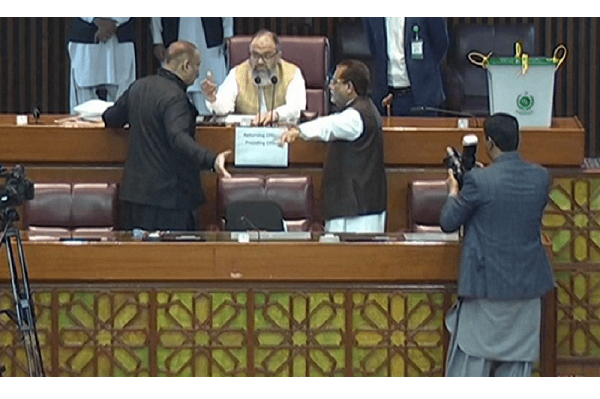KARACHI: Pakistan Stock Exchange above the 98,000 mark on Friday as share prices surged more than 2,000 points in intraday trade
ISLAMABAD: Elections on 30 vacant Senate seats are currently under way in the National Assembly and provincial legislatures of Punjab and Sindh.
Elections are not being held in Balochistan as lawmakers on the vacant seats there had been elected unopposed. However, the dispute over the swearing-in of the Khyber Pakhtunkhwa Assembly’s opposition members elected to reserved seats is still far from resolved.
Polling has not yet begun in the province as provincial election commissioner Shamshad Khan sought a list of the sworn-in MPAs from the assembly staff. He reached the KP Assembly and reviewed the poll arrangements there.
Earlier today, the provincial opposition filed a petition in the Election Commission of Pakistan (ECP) seeking postponement of the Senate polls there. Uncertainty persists as Shamshad contacted Chief Election Commissioner Sikander Sultan Raja about the opposition plea.
The ECP had hinted at postponing the Senate elections for KP if assembly speaker Babar Saleem Swati kept on delaying their oath-taking.
Yesterday, Swati had filed a review petition against the PHC order wherein it directed him to administer oaths to 25 opposition MPAs elected to reserved seats
As many as 59 candidates are contesting the Senate polls after 18 were elected unopposed from Punjab and Balochistan. According to state-run Radio Pakistan, the Election Commission of Pakistan (ECP) has finalised all preparations for the polls.
Polling started at 9am and is set to conclude at 4pm. Ballot papers in four different colours have been printed — white papers will be used for general seats, green for technocrat seats, pink for women, and yellow for minority seats.
In Islamabad, polling began at the NA hall for the election of two senators. In Punjab, voting is being held on two women and technocrats seats each and one minority seat of women in the province.
In Sindh, nineteen candidates are contesting for twelve seats including seven General seats, two women, two technocrats/Ulema and one non-Muslim seat in the province
The Senate became dysfunctional on March 11 following the retirement of 52 lawmakers.
The elections are likely to see parties in the ruling coalition — the PML-N and PPP — move closer to a two-thirds majority in the upper house of parliament.
The opposition PTI will likely maintain its position as the single largest party in the new house, but it will be in no position to hamper the government’s legislative business.
Those who have made their way to the upper house of parliament unopposed include PML-N’s Syedal Nasir and Shahzeb Durrani, PPP’s Sardar Umar Gorgej, Jamiat Ulema-i-Islam-Fazl’s (JUI-F) Ahmed Khan and Awami National Party’s (ANP) Aimal Khan on general seats in Balochistan.
Likewise, National Party’s Jan Muhammad, former caretaker prime minister Anwaarul Haq Kakar who contested as an independent, PPP’s Hasana Bano and PML-N’s Rahat Jamali were also elected unopposed.
PPP’s Bilal Ahmed Khan and JUI-F’s Maulana Wasay have won two seats reserved for ulema/technocrats in Balochistan.
Similarly, seven members from Punjab were among those who won unopposed in the Senate elections. Elections were to be held on a total of 12 seats in Punjab, out of which seven are general seats and candidates have won all these seven seats unopposed.
They include Interior Minister Mohsin Naqvi (independent) who has served as caretaker Punjab chief minister, and PML-N’s Pervaiz Rashid, Ahad Cheema, Talal Chaudhry, and Nasir Mehmood. Other successful candidates are Majlis Wahdat-i-Muslimeen’s (MWM) Raja Nasir Abbas and PTI’s Hamid Khan.
Senate composition
The Senate consists of 96 lawmakers. However, only 48 seats were up for grabs this year — 12 each from Punjab and Sindh, 11 each from KP and Balochistan and two from Islamabad — as half of the senators are elected at one time, and the other half three years later.
Each senator serves a term of six years, barring resignation, disqualification or other extraordinary circumstances.
The Senate comprises 23 members each from the four federating units and four from Islamabad. The 23 seats allocated to a province comprise 14 general seats, four reserved for women, four for technocrats and one for minority members.
The ECP said that in all, 147 candidates had filed nomination papers for 48 Senate seats, of whom 18 had been elected unopposed. They include seven each against general seats from Punjab and Balochistan and two each against reserved seats for women and technocrats from Balochistan. That means there will be no election in Balochistan.
In Punjab, where all the seven candidates against general seats have already been elected unopposed, three candidates are in the run for two seats reserved for technocrats, four for two reserved seats for women, and two candidates for one seat reserved for minorities.
As many as 16 candidates are contesting against seven general seats from KP. Six candidates are in the run for two seats reserved for technocrats and four for two seats reserved for women from the province.
Two candidates each are vying for a general and a technocrat seat from the federal capital.
As many as 11 candidates are vying for seven general seats from Sindh. Three candidates are in the run for two seats reserved for women, four for two seats reserved for technocrats and two for one seat reserved for minorities from the province.
You May Also Like
TEHRAN: The head of Iran’s Revolutionary Guards described the arrest warrant issued by the International Criminal Court for Israeli Prime
LOWER KURRAM: The death toll in yesterday’s gun attack on passenger vans in Khyber Pakhtunkhwa’s Lower Kurram has risen to 42,






